人教英语选修7Unit 2 Learning about language (共30张PPT)
文档属性
| 名称 | 人教英语选修7Unit 2 Learning about language (共30张PPT) |  | |
| 格式 | zip | ||
| 文件大小 | 2.8MB | ||
| 资源类型 | 教案 | ||
| 版本资源 | 人教版(新课程标准) | ||
| 科目 | 英语 | ||
| 更新时间 | 2020-03-18 12:12:23 | ||
图片预览


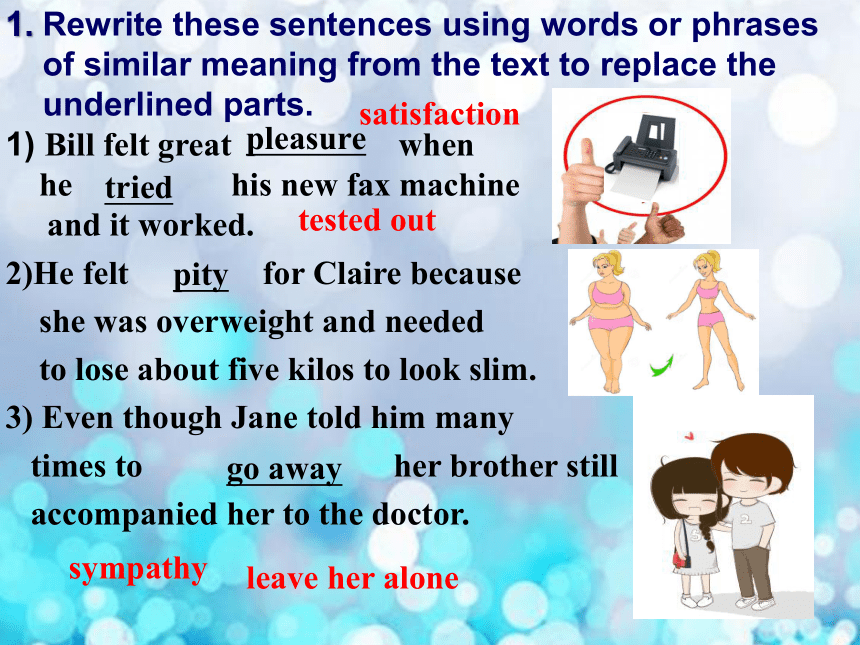

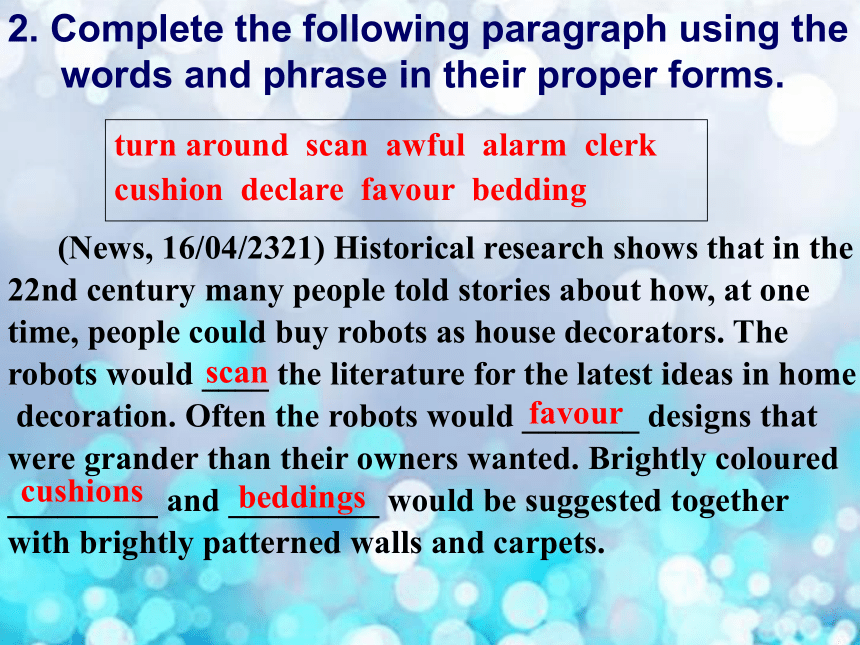
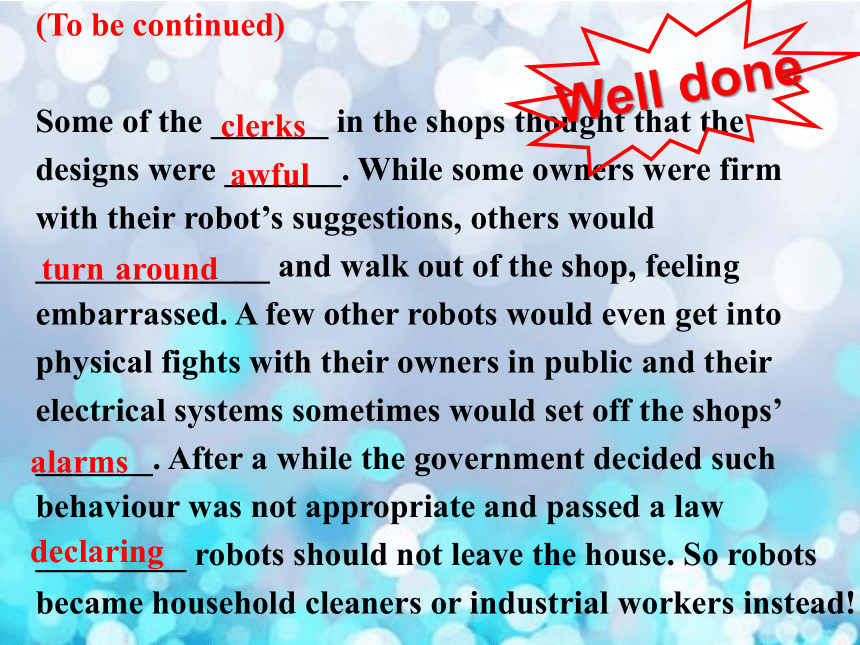
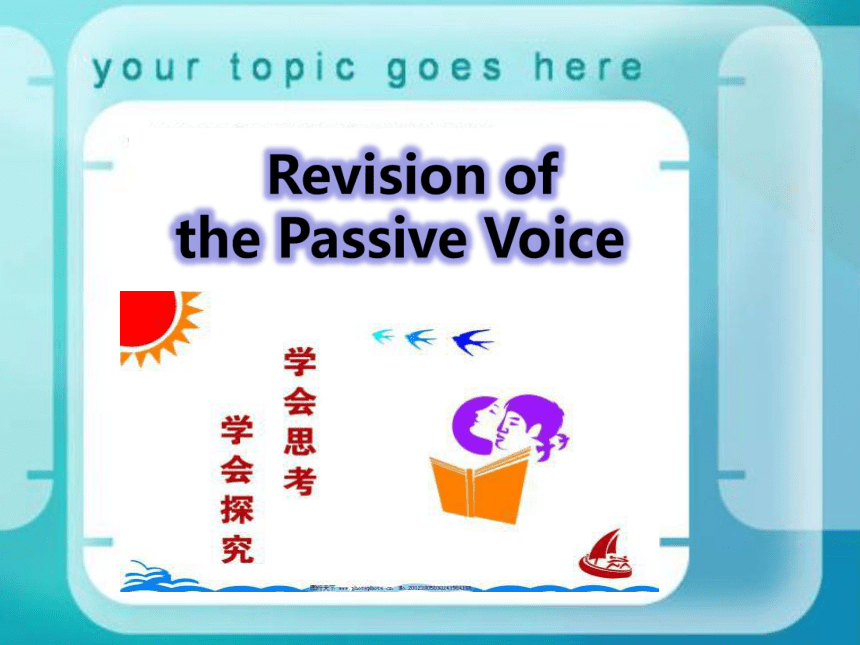
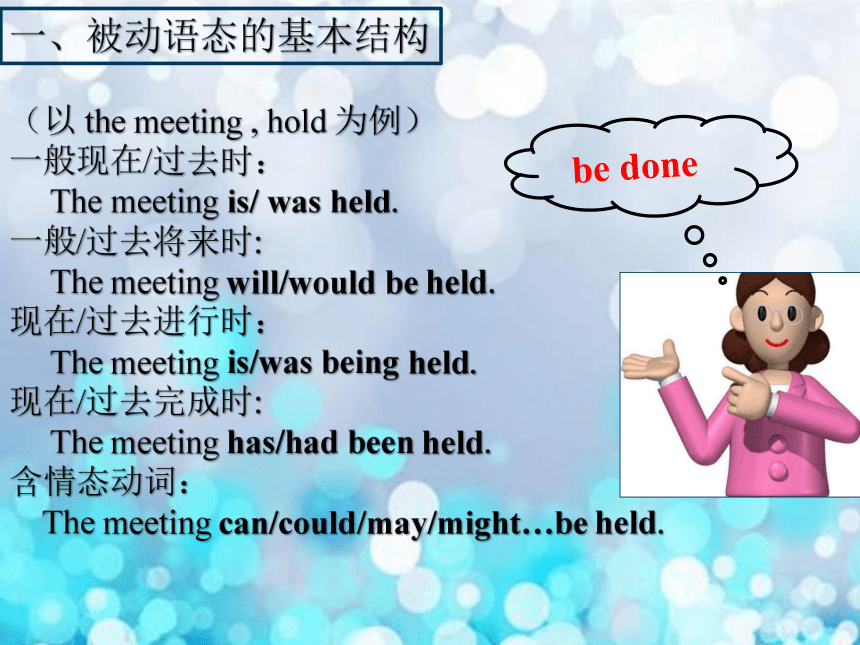
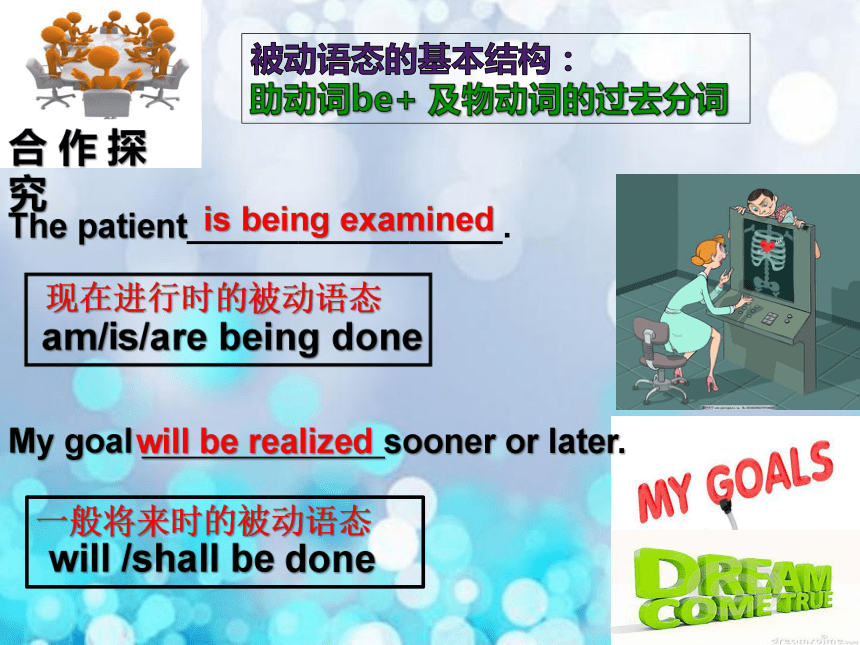

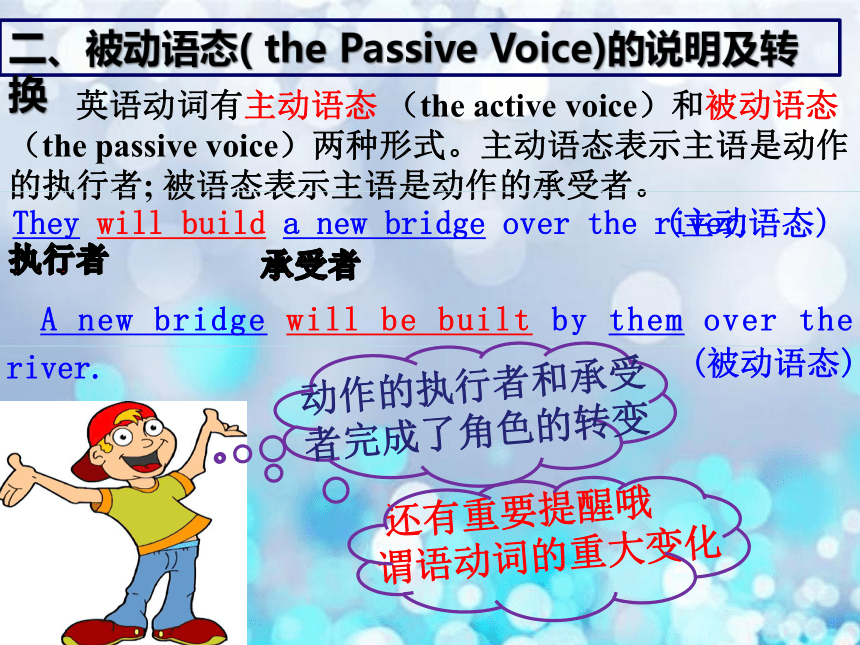
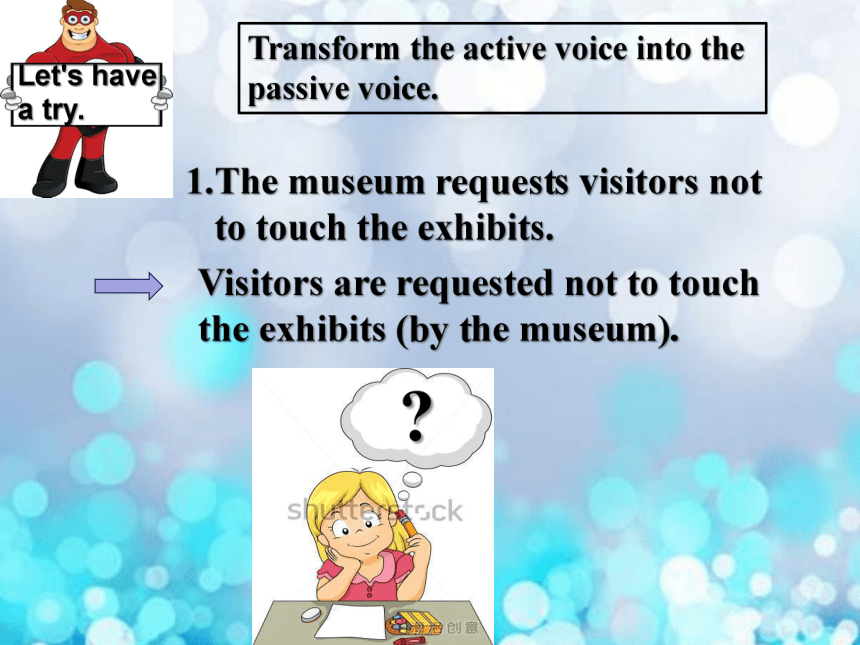
文档简介
(共30张PPT)
普通高中课程标准实验教科书
选修 7
Unit 2 Robots
Learning about Language
1. Rewrite these sentences using words or phrases
of similar meaning from the text to replace the
underlined parts.
1) Bill felt great when
he his new fax machine
and it worked.
2)He felt for Claire because
she was overweight and needed
to lose about five kilos to look slim.
3) Even though Jane told him many
times to her brother still
accompanied her to the doctor.
tested out
satisfaction
pleasure
tried
pity
sympathy
go away
leave her alone
4) Her greatest was to look
as elegant as Gladys Claffern.
5) Please before you buy
a new digital camera so I can go with you.
6) She the computer screen carefully hoping
to find some new emails in her mailbox.
7) It was that his own mother
would not talk to him about the affair.
8) He felt happy when his boss that
he could set aside some time for exercise.
desire
ring me up
scanned
wish
call me
looked at
ridiculous
stated
absurd
declared
2. Complete the following paragraph using the
words and phrase in their proper forms.
turn around scan awful alarm clerk
cushion declare favour bedding
(News, 16/04/2321) Historical research shows that in the
22nd century many people told stories about how, at one
time, people could buy robots as house decorators. The
robots would ____ the literature for the latest ideas in home
decoration. Often the robots would _______ designs that
were grander than their owners wanted. Brightly coloured
_________ and _________ would be suggested together
with brightly patterned walls and carpets.
scan
favour
cushions
beddings
(To be continued)
Some of the _______ in the shops thought that the
designs were _______. While some owners were firm
with their robot’s suggestions, others would
______________ and walk out of the shop, feeling
embarrassed. A few other robots would even get into
physical fights with their owners in public and their
electrical systems sometimes would set off the shops’
_______. After a while the government decided such
behaviour was not appropriate and passed a law
_________ robots should not leave the house. So robots
became household cleaners or industrial workers instead!
clerks
awful
turn around
alarms
declaring
Well done
(以 the meeting , hold 为例)
一般现在/过去时:
The meeting is/ was held.
一般/过去将来时:
The meeting will/would be held.
现在/过去进行时:
The meeting is/was being held.
现在/过去完成时:
The meeting has/had been held.
含情态动词:
The meeting can/could/may/might…be held.
一、被动语态的基本结构
be done
The patient_________________.
My goal sooner or later.
is being examined
一般将来时的被动语态
will be realized
am/is/are being done
will /shall be done
现在完成时的被动语态
将来完成时的被动语态
Before you come back, the building
.
Those dishes .
have been washed
will have been finished
have / has been done
shall / will have been done
英语动词有主动语态 (the active voice)和被动语态(the passive voice)两种形式。主动语态表示主语是动作的执行者; 被语态表示主语是动作的承受者。
They will build a new bridge over the river.
A new bridge will be built by them over the river.
(主动语态)
(被动语态)
动作的执行者和承受者完成了角色的转变
还有重要提醒哦
谓语动词的重大变化
二、被动语态( the Passive Voice)的说明及转换
Transform the active voice into the passive voice.
Visitors are requested not to touch
the exhibits (by the museum).
1.The museum requests visitors not
to touch the exhibits.
?
三、动词不定式的被动式
不定式与其逻辑主语之间是被动关系时,要用不定式的被动式。
He thought it an honour (invite) to the party.
to have been invited
The couple were having a wonderful time. However,
The lady refused ______________________.
to be taken photos of
Fill in the blanks.
1.作主语:
It is an honour for me to be asked to speak here.
2.作宾语:
She asked to be sent to work in Xinjiang.
3.构成复合宾语:
Someone took away my umbrella . I’d never expect it
to be returned.
4.构成复合谓语:
The books are not allowed to be taken out of the room.
5.作定语:
Are you going to the meeting to be held in the teachers’
office?
6.作状语:
She was too young to be assigned such work.
四、动词不定式的被动式语法功能
It is said/ believed/ supposed/ reported/hoped/well known/ suggested that sb./sth…. .
= sb./sth. is said/ believed/ supposed/ reported/
hoped/well known/ suggested to do
据说/人们相信/据推测/据报导/人们希望/ 众所周知/
有人建议
五、固定句型
People believe that he was admitted into
a key university.
Transform the sentence.
he was admitted into
a key university.
have been admitted into
a key university.
大家相信他被一所重点大学录取了。
It is believed that
He is believed to
某些连系动词,如:look, feel, smell, sound, prove等。
The flower smells sweet.
Maria proves very patient and warm-hearted.
2. “形容词+不定式”。如:nice, easy, fit, hard,
difficult, important, impossible, pleasant,
interesting等。
This problem is difficult to work out.
六、动词的主动形式表示被动
3. want/need/require + doing/ to be done
The car needs repairing.
=The car needs to be repaired.
right
We need some paper to write.
wrong
We need some paper to write on.
①
2.He is an impossible person to work.
The armchair is comfortable to sit in.
译:这扶手椅坐起来很舒服。
___________________________
1.We all know that ice is felt cold.
with
?
feels
Correct the sentences.
4. 在too… to… ; enough…to…结构中。
This book is too expensive (for me) to buy.
5. 一些作表语用的不定式的主动形式。常见的这类
动词有 let (出租), rent, hire, blame 等。 The house is to let.
6.在“with + 宾语 + to do”结构中。 With so many exercises to do, I can’t go to
the cinema.
六、动词的主动形式表示被动
②
3. With nothing (要做),he lay
in bed.
2. Nobody was (应受责备)for
the accident.
1.The house is big enough (居住).
to live in
to blame
to do
Fill in the blanks.
7. 有些动词既是及物又是不及物,当它们和well, badly, easily等副词连用时,表示主语内在品质或性能,是不及物动词,用主动表示被动,这时不用被动语态,常见的有:write, read, clean, sell, wash, cook 等。如:
The cloth washes easily. 这布很好洗。
这支笔写字很流畅。翻译:
对比:
The books sell well. (主动句)
The books were sold out. (被动句)
六、动词的主动形式表示被动
③
The pen writes smoothly.
Correct the sentence.
sent
or:去掉 to be
The package needs to be sending .
This house seems ______________
by a good architect.
The house ____________.
to have been designed
is being sold
was built
The house _________ last year.
Say something about the pictures.
式
时
am/is/are being done
has/have been done
was/were being done
had been done
shall/will have been done
被动语态的基本结构
am/is/are done
was/were done
shall/will be done
一 般 进 行 完 成
现 在
过 去
将 来
to be
done
to have
been done
态
式
动词不定式的被动语态结构
一般式 进行式 完成式 完成进行式
主 动 to do to be doing to have done to have been doing
被 动
Go over words and expressions.
Go over the grammar.
普通高中课程标准实验教科书
选修 7
Unit 2 Robots
Learning about Language
1. Rewrite these sentences using words or phrases
of similar meaning from the text to replace the
underlined parts.
1) Bill felt great when
he his new fax machine
and it worked.
2)He felt for Claire because
she was overweight and needed
to lose about five kilos to look slim.
3) Even though Jane told him many
times to her brother still
accompanied her to the doctor.
tested out
satisfaction
pleasure
tried
pity
sympathy
go away
leave her alone
4) Her greatest was to look
as elegant as Gladys Claffern.
5) Please before you buy
a new digital camera so I can go with you.
6) She the computer screen carefully hoping
to find some new emails in her mailbox.
7) It was that his own mother
would not talk to him about the affair.
8) He felt happy when his boss that
he could set aside some time for exercise.
desire
ring me up
scanned
wish
call me
looked at
ridiculous
stated
absurd
declared
2. Complete the following paragraph using the
words and phrase in their proper forms.
turn around scan awful alarm clerk
cushion declare favour bedding
(News, 16/04/2321) Historical research shows that in the
22nd century many people told stories about how, at one
time, people could buy robots as house decorators. The
robots would ____ the literature for the latest ideas in home
decoration. Often the robots would _______ designs that
were grander than their owners wanted. Brightly coloured
_________ and _________ would be suggested together
with brightly patterned walls and carpets.
scan
favour
cushions
beddings
(To be continued)
Some of the _______ in the shops thought that the
designs were _______. While some owners were firm
with their robot’s suggestions, others would
______________ and walk out of the shop, feeling
embarrassed. A few other robots would even get into
physical fights with their owners in public and their
electrical systems sometimes would set off the shops’
_______. After a while the government decided such
behaviour was not appropriate and passed a law
_________ robots should not leave the house. So robots
became household cleaners or industrial workers instead!
clerks
awful
turn around
alarms
declaring
Well done
(以 the meeting , hold 为例)
一般现在/过去时:
The meeting is/ was held.
一般/过去将来时:
The meeting will/would be held.
现在/过去进行时:
The meeting is/was being held.
现在/过去完成时:
The meeting has/had been held.
含情态动词:
The meeting can/could/may/might…be held.
一、被动语态的基本结构
be done
The patient_________________.
My goal sooner or later.
is being examined
一般将来时的被动语态
will be realized
am/is/are being done
will /shall be done
现在完成时的被动语态
将来完成时的被动语态
Before you come back, the building
.
Those dishes .
have been washed
will have been finished
have / has been done
shall / will have been done
英语动词有主动语态 (the active voice)和被动语态(the passive voice)两种形式。主动语态表示主语是动作的执行者; 被语态表示主语是动作的承受者。
They will build a new bridge over the river.
A new bridge will be built by them over the river.
(主动语态)
(被动语态)
动作的执行者和承受者完成了角色的转变
还有重要提醒哦
谓语动词的重大变化
二、被动语态( the Passive Voice)的说明及转换
Transform the active voice into the passive voice.
Visitors are requested not to touch
the exhibits (by the museum).
1.The museum requests visitors not
to touch the exhibits.
?
三、动词不定式的被动式
不定式与其逻辑主语之间是被动关系时,要用不定式的被动式。
He thought it an honour (invite) to the party.
to have been invited
The couple were having a wonderful time. However,
The lady refused ______________________.
to be taken photos of
Fill in the blanks.
1.作主语:
It is an honour for me to be asked to speak here.
2.作宾语:
She asked to be sent to work in Xinjiang.
3.构成复合宾语:
Someone took away my umbrella . I’d never expect it
to be returned.
4.构成复合谓语:
The books are not allowed to be taken out of the room.
5.作定语:
Are you going to the meeting to be held in the teachers’
office?
6.作状语:
She was too young to be assigned such work.
四、动词不定式的被动式语法功能
It is said/ believed/ supposed/ reported/hoped/well known/ suggested that sb./sth…. .
= sb./sth. is said/ believed/ supposed/ reported/
hoped/well known/ suggested to do
据说/人们相信/据推测/据报导/人们希望/ 众所周知/
有人建议
五、固定句型
People believe that he was admitted into
a key university.
Transform the sentence.
he was admitted into
a key university.
have been admitted into
a key university.
大家相信他被一所重点大学录取了。
It is believed that
He is believed to
某些连系动词,如:look, feel, smell, sound, prove等。
The flower smells sweet.
Maria proves very patient and warm-hearted.
2. “形容词+不定式”。如:nice, easy, fit, hard,
difficult, important, impossible, pleasant,
interesting等。
This problem is difficult to work out.
六、动词的主动形式表示被动
3. want/need/require + doing/ to be done
The car needs repairing.
=The car needs to be repaired.
right
We need some paper to write.
wrong
We need some paper to write on.
①
2.He is an impossible person to work.
The armchair is comfortable to sit in.
译:这扶手椅坐起来很舒服。
___________________________
1.We all know that ice is felt cold.
with
?
feels
Correct the sentences.
4. 在too… to… ; enough…to…结构中。
This book is too expensive (for me) to buy.
5. 一些作表语用的不定式的主动形式。常见的这类
动词有 let (出租), rent, hire, blame 等。 The house is to let.
6.在“with + 宾语 + to do”结构中。 With so many exercises to do, I can’t go to
the cinema.
六、动词的主动形式表示被动
②
3. With nothing (要做),he lay
in bed.
2. Nobody was (应受责备)for
the accident.
1.The house is big enough (居住).
to live in
to blame
to do
Fill in the blanks.
7. 有些动词既是及物又是不及物,当它们和well, badly, easily等副词连用时,表示主语内在品质或性能,是不及物动词,用主动表示被动,这时不用被动语态,常见的有:write, read, clean, sell, wash, cook 等。如:
The cloth washes easily. 这布很好洗。
这支笔写字很流畅。翻译:
对比:
The books sell well. (主动句)
The books were sold out. (被动句)
六、动词的主动形式表示被动
③
The pen writes smoothly.
Correct the sentence.
sent
or:去掉 to be
The package needs to be sending .
This house seems ______________
by a good architect.
The house ____________.
to have been designed
is being sold
was built
The house _________ last year.
Say something about the pictures.
式
时
am/is/are being done
has/have been done
was/were being done
had been done
shall/will have been done
被动语态的基本结构
am/is/are done
was/were done
shall/will be done
一 般 进 行 完 成
现 在
过 去
将 来
to be
done
to have
been done
态
式
动词不定式的被动语态结构
一般式 进行式 完成式 完成进行式
主 动 to do to be doing to have done to have been doing
被 动
Go over words and expressions.
Go over the grammar.
